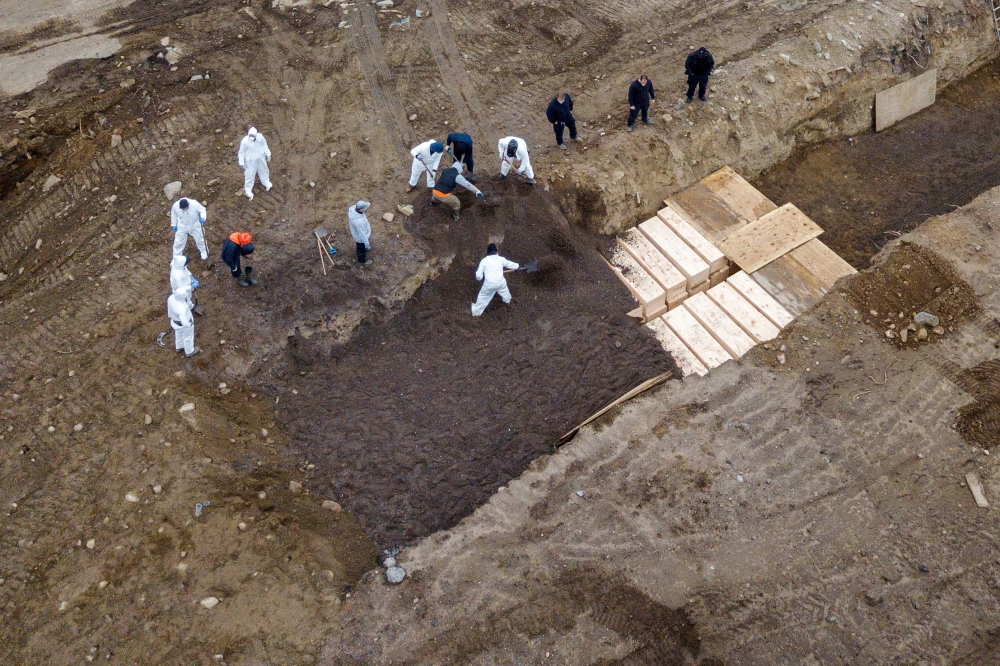Bangkok, Thailand/Johannesburg, South Africa
Thomson Reuters Foundation
The coronavirus pandemic has exacerbated the problem of scarce burial space in cities, even as health concerns and tight budgets force more families to opt against traditional grave burials, land rights experts said on Monday.
As cities around the world have rapidly expanded in recent decades, urban cemeteries have filled up or been dug up to build roads and homes, leading to an increase in cremations.
“This trend will continue with urbanisation. COVID-19 may just cause us to think about this in the immediate term,” said Peter Davies, an associate professor at the department of earth and environmental sciences at Australia’s Macquarie University.
“There would be increasing pressure for cremations as a more cost- and space-effective, and possibly safer solution from a disease transmission perspective,” he told the Thomson Reuters Foundation.

Drone pictures show bodies being buried on New York’s Hart Island where the department of corrections is dealing with more burials overall, amid the coronavirus disease outbreak in New York City, US, on 9th April. PICTURE: Reuters/Lucas Jackson/File Photo
Globally, there have been more than two million reported cases of the coronavirus, and more than 165,000 people have died, according to a Reuters tally.
Before the outbreak, in cities such as Singapore and Hong Kong where even columbaria for urns containing ashes have filled up, historians and conservationists moved to protect the last remaining cemeteries and safeguard their heritage and tradition.
In Britain, cities where burials are still the norm have proposed shared burial plots as space runs out.
The challenge facing city authorities now – to dispose of bodies quickly and safely – was brought to the fore when a New York City councilman said earlier this month that public parks may be used as temporary burial grounds.
City officials refuted the claim, but said some recent burials in a so-called potter’s field on Hart Island, which has been used since the 19th century for burying the poor or those with no known next of kin, included victims of the coronavirus.
In Ecuador, authorities are preparing an emergency burial ground on land donated by a private cemetery in Guayaquil, the country’s largest city, to address a shortage of burial plots.
Communal graves
Cemeteries in South Africa have been asked to identify land for emergency burials, and consider “communal graves” for 20 bodies in the event of many coronavirus deaths, said Pepe Dass, chairman of the South African Cemeteries Association.
“South Africa has serious issues with access to land in metropolitan areas, but also in rural areas,” said Dass, adding that conservation and residential developments take precedence, not cemeteries because they are not considered sustainable.
“I definitely hope South Africa will become more sustainable in the way we think about burials. This is a wake up call.”
As the pandemic brings greater awareness of mortality and consideration of funerary practices, there is an opportunity to rethink how we care for the dead, said David Neustein, an architect in Sydney and an advocate of “natural burial”.
“It is the simplest, least energy-intensive alternative we have, and one that is highly compatible with environmental repair and regeneration,” he said of the process in which a body is simply put into the ground in designated areas, casket-free.
Neustein had earlier proposed a “burial belt”, where bodies are placed in the soil among newly planted vegetation near towns and cities. It would reforest cleared land and create “near-limitless” land for burial, he said.
“It can be implemented much more quickly than conventional cemeteries…and provide lasting green monuments to this terrible time,” he said.
– Additional reportiony by ELLEN WULFHORST in New York






